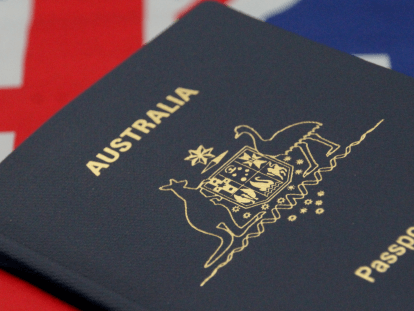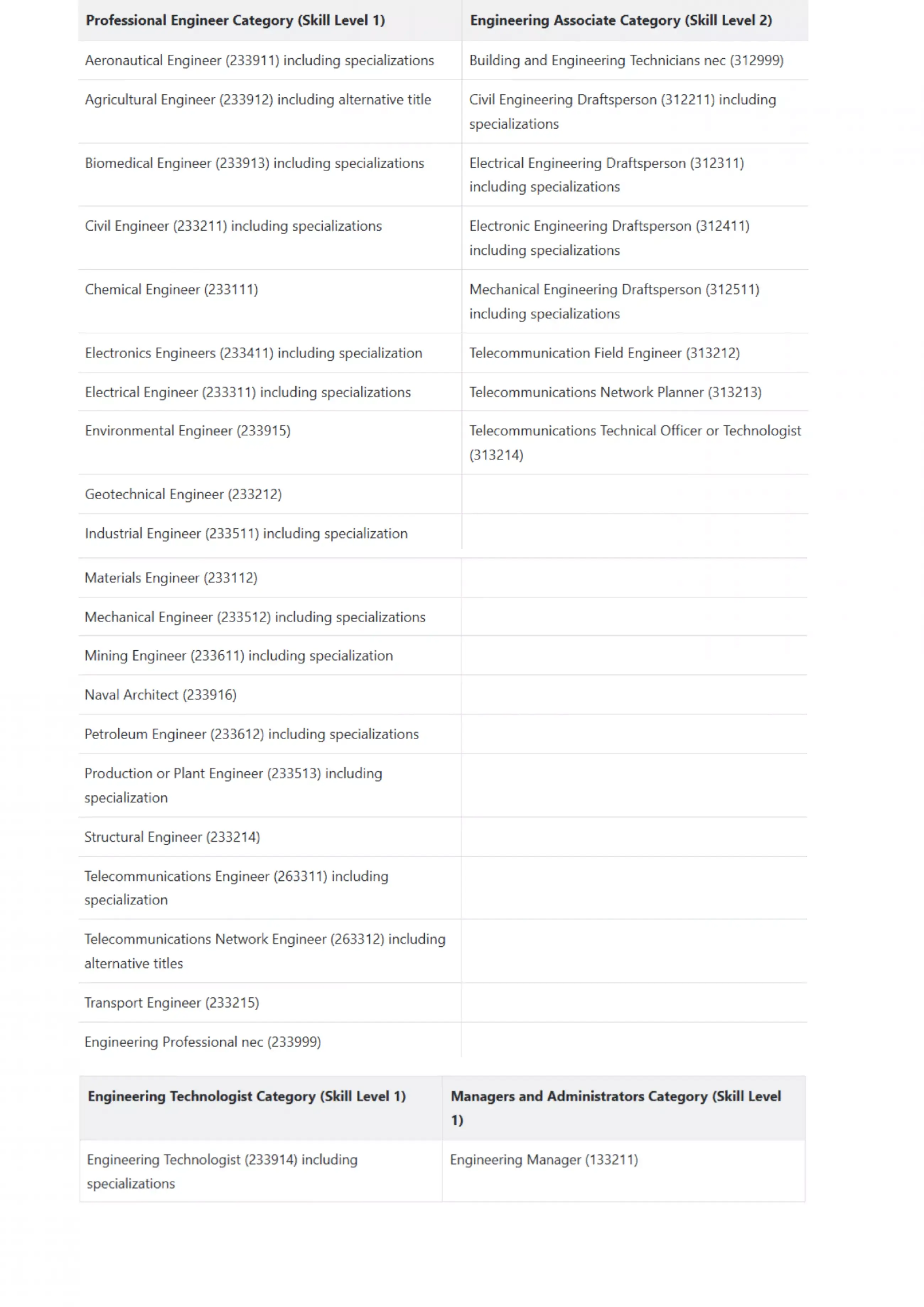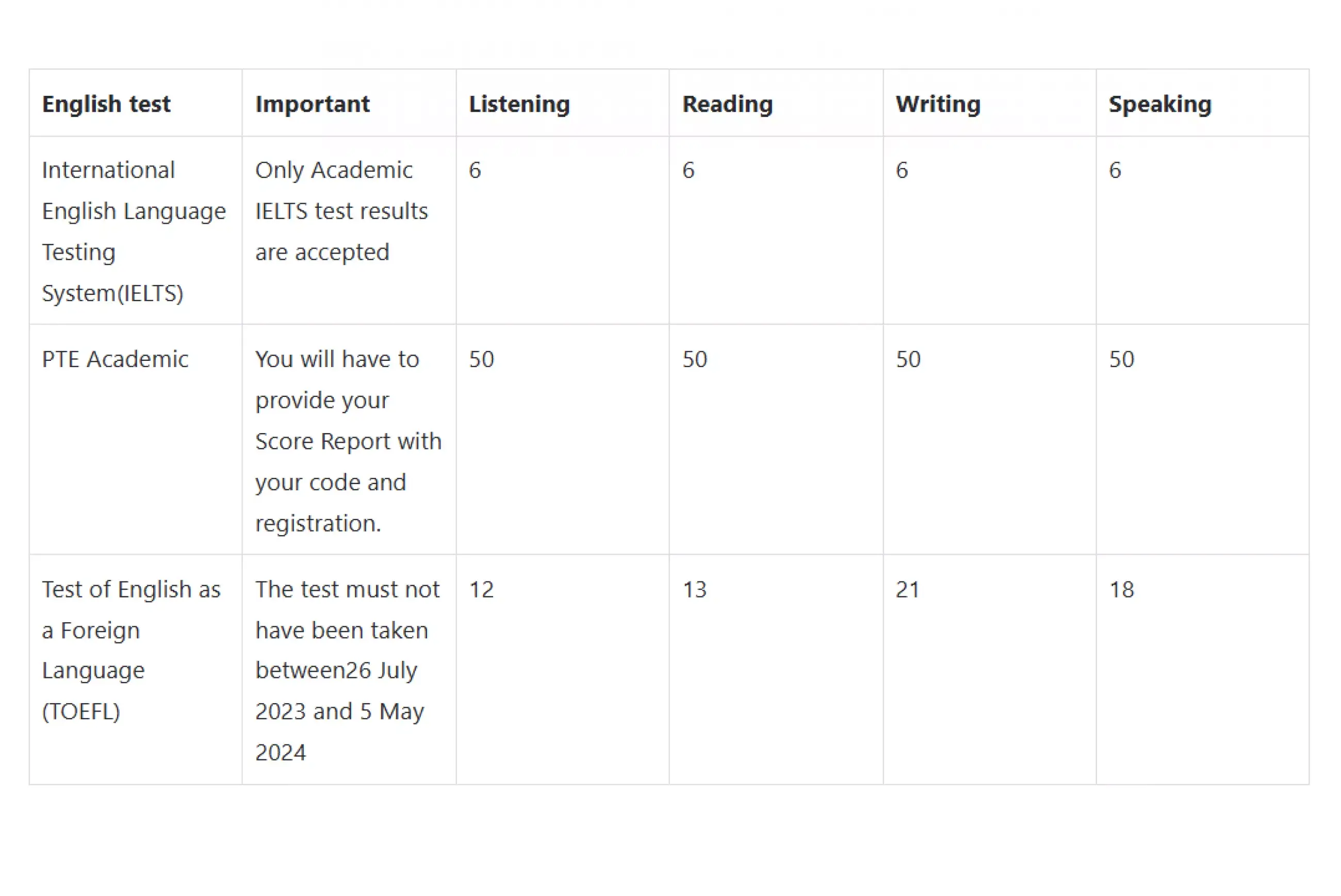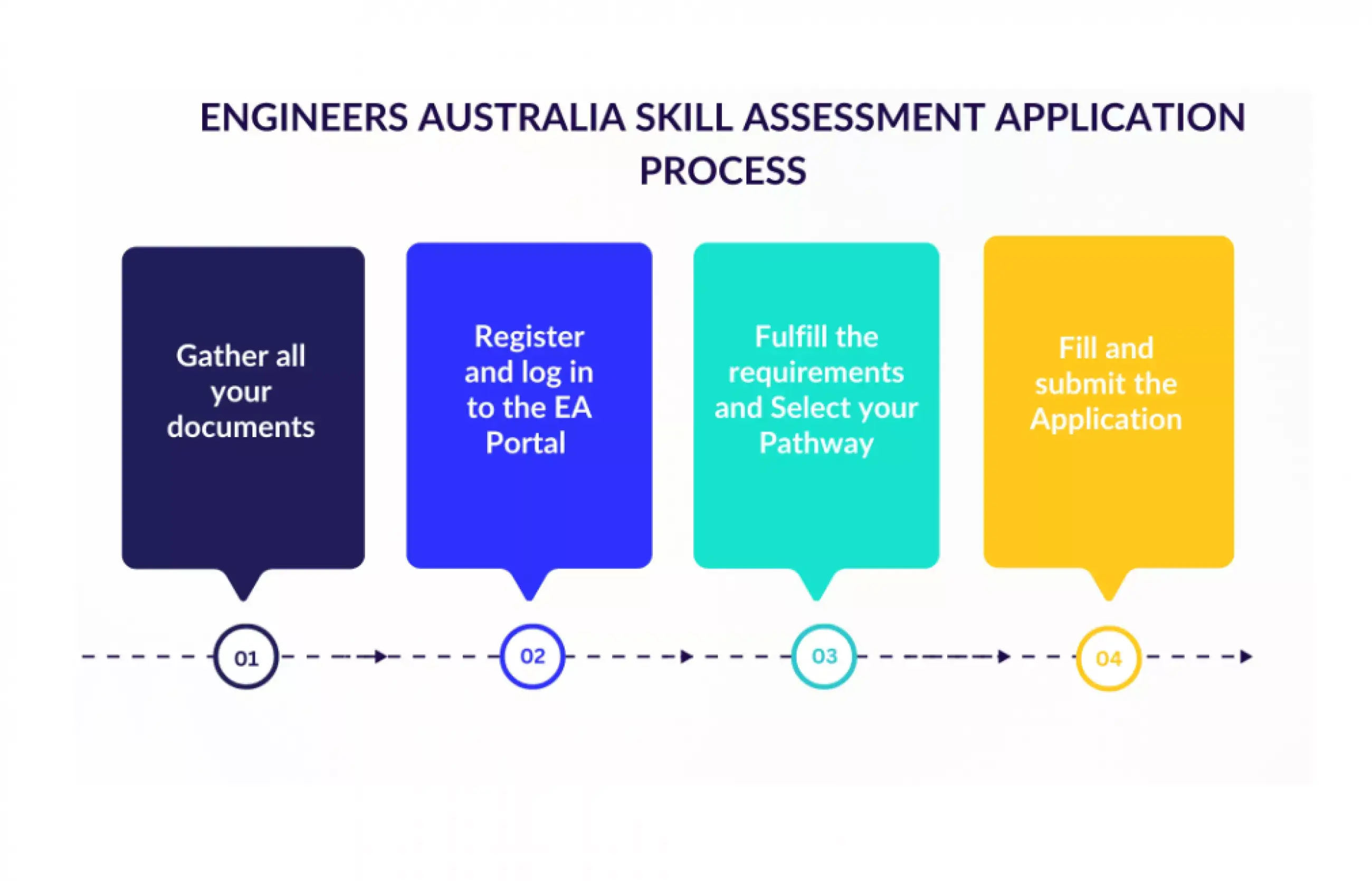Engineers Australia Skills Assessment

If you are an individual in the field of engineering looking to move to Australia under the general skilled migration program or for specific employer-sponsored visas, you probably know how important a skills assessment is. One of the key steps in this process is obtaining a skills assessment from Engineers Australia (EA). In this blog, we’ll guide you through the Engineers Australia skills assessment requirements and process and address common questions to help you navigate it smoothly.
In this Blog, we will answer questions such as:
-
How to determine the relevant skills assessing authority for your engineering occupation?
-
What are the general requirements for the Engineers Australia skills assessment?
-
What are the Qualification requirements for Engineers Australia Skills Assessment?
-
What is the English Language requirement?
-
What are the Work Experience requirements?
-
What are Accredited Pathways, and how do they affect your assessment?
-
What documents are required?
-
What are the Skilled Employment Assessment for Engineers Australia?
-
Outcome of the Assessment.
-
FAQs
How to Determine the Relevant Skills Assessing Authority for Your Engineering Occupation
To guarantee that your engineering credentials and work experience are appropriately assessed for migration or professional recognition, it is essential to select the appropriate skills assessment authority. The approved authority for evaluating the credentials and expertise of engineers looking to immigrate to Australia is typically Engineers Australia (EA).
You can consult the Department of Home Affairs' Skilled Occupation List to find out if EA is the appropriate authority for your line of work. This list connects the appropriate evaluating body to each engineering occupation. While EA covers a wide range of engineering professions, specialized sections may come under various authorities. Verify the appropriate evaluating authority according to your line of work.
You can simply verify your skills assessing authority by visiting the skilled occupation list of the Department of Home Affairs webpage. Below are the occupations that the EA is authorized to conduct skills assessments for, so if your occupation is on the list, the EA is the correct skills-assessing authority to conduct your skills assessment.
What are the general requirements for the Engineers Australia Skills Assessment?
The following requirements are typically necessary for a successful skills assessment:
-
Academic Qualifications
-
English Language Proficiency
-
Work Experience
1. What are the Academic Qualifications requirements for Engineers Australia Skills Assessment?
Australia recognizes different categories within the engineering profession, each with its own qualifications and roles. You must have an engineering degree or higher that meets Australian standards. Here's a breakdown:
-
Professional Engineer: Requires a 4-year bachelor’s degree in engineering. Professional Engineers manage projects, apply systematic design processes, and provide leadership across various engineering sectors.
-
Engineering Technologist: Requires a 3-year bachelor’s degree in technology. Engineering Technologists focus on specific interactions within systems and utilize established techniques to enhance technology.
-
Engineering Associate: Requires a 2-year Australian Advanced Diploma or associate degree. Engineering Associates assist with technical support, drafting, inspection, and site assessments.
-
Engineering Manager: Focuses on strategy formulation and overseeing engineering operations. This role falls under the Managers ANZSCO group, not directly under engineering occupations.
2. What is the English Language requirement for Engineers Australia Skills Assessment?
A recognized English language test, such as IELTS or PTE, is required to prove your proficiency.
How long are the English language proficiency tests valid for?
The tests results must not be more than 2 years old at the time your application is submitted.
-
Exemptions:
The following candidates might not be required to submit an English language test:
-
Candidates who have finished an Australian undergraduate engineering degree, a two-year (92-week) full-time master's degree, or a doctoral program at an Australian university. For this reason, documentation proving complete completion of the Australian certification is necessary for exemption;
-
A citizen of the United Kingdom, the United States of America, Canada, New Zealand, or the Republic of Ireland who possesses a valid passport
Please be aware that exemptions are decided on an individual basis.
In order to demonstrate that you are exempt, you must submit a cover letter to Engineers Australia.
3. What are the Work Experience requirements for Engineers Australia Skills Assessment?
Your work experience, especially in the engineering field, will be assessed, particularly if applying for professional-level migration.
-
Relevance of Work Experience:
-
Your work experience should be directly related to the engineering profession you're applying for.
-
The role must match the qualifications and tasks outlined in the ANZSCO (Australian and New Zealand Standard Classification of Occupations) codes for the specific engineering occupation you're applying for.
-
-
Detailed Job Descriptions:
-
Provide a clear description of your job responsibilities, projects, and accomplishments that align with the technical skills and expertise of the engineering role.
-
Highlight your involvement in solving engineering problems, designing systems or processes, and any leadership or managerial responsibilities you undertook.
-
-
Skills Assessment:
-
If you're applying for migration under the Skilled Migration program, you’ll need a positive skills assessment from a relevant assessing authority like Engineers Australia (EA).
-
Engineers Australia will evaluate your qualifications and work experience to ensure they meet Australian standards for the engineering profession.
-
-
Duration of Work Experience:
-
The length of work experience needed varies depending on the migration pathway. For example, at least 3 years of relevant experience is usually required for most skilled migration programs, though this can vary based on your qualifications and country of origin.
-
For professional-level migration, it's often necessary to have post-qualification experience.
-
-
Evidence and Documentation:
-
Provide documents that prove the authenticity of your work experience, such as:
-
Reference letters from employers detailing your job roles and responsibilities.
-
Payslips, tax records, or contracts that show your employment history.
-
Any awards or recognitions you've received for your work.
-
-
-
Continuity and Progression:
-
It's essential to show that your work experience is continuous and progressive, meaning that you're not just fulfilling basic tasks but are also advancing in your field and taking on more complex responsibilities.
-
If applicable, show career advancement, certifications, or training you've received that directly relate to the engineering profession.
-
-
Professional Recognition: Membership in professional engineering bodies (like Engineers Australia) can help support your application.
What are Accredited Pathways, and how do they affect your assessment?
Engineers Australia recognizes both Australian and overseas qualifications through international agreements such as the Washington Accord, Sydney Accord, and Dublin Accord. These agreements allow individuals to have their qualifications assessed for migration purposes.
-
Australian Qualifications: Graduates of accredited Australian programs are eligible for skills assessment. Offshore Australian qualifications are also recognized but require proof of English proficiency.
-
Washington Accord: Recognition for qualifications accredited by signatory bodies.
-
Sydney Accord: Applies to 3-year Bachelor of Technology programs. Technologist qualification from signatory country.
-
Dublin Accord: Applies to 2-year Advanced Diplomas or associate degrees. Associate qualification from member country.
If your qualifications are not accredited under these accords, you may need to submit a Competency Demonstration Report (CDR).
Competency Demonstration Report (CDR) and Further Learning
If your postgraduate qualification is not independently accredited, or you do not hold an accredited undergraduate qualification, you will need to submit a Competency Demonstration Report (CDR). This report will consider your combined qualifications (undergraduate and postgraduate).
-
If you have credit/recognition for prior learning (RPL), you must upload original documents from the tertiary institution where the subjects were completed.
Recognition of Occupational Outcome
The outcome of your assessment will usually correspond to the title and/or content of your degree. In the case of double majors, the outcome will reflect the dominant major. You may submit a cover letter to indicate your preference, but this does not guarantee the recognition of that occupation.
Important Notes on Accords
-
Only qualifications from signatory countries can be recognized under the Accords.
-
Qualifications must be obtained in or after the year when the country became a full signatory to a particular Accord.
What documents are required for the Engineers Australia skills assessment?
To ensure your skills assessment is processed correctly, you’ll need to provide several documents:
-
Identification: Passport or national ID, with additional documents for any name changes.
-
English Language Requirement: IELTS, TOEFL, or PTE test results or a completion certificate from a Professional Year Program.
-
Academic Qualifications: Official degree certificates and transcripts.
-
Professional Body Qualifications: Not mandatory, but membership certificates from bodies like Engineers Australia can strengthen your application.
-
Syllabus for Non-Accredited Qualifications: If your qualifications come from a non-accredited institution, you’ll need to provide detailed syllabus for the courses you completed.
What are the Skilled Employment Assessment for Engineers Australia (EA)?
The Skilled Employment Assessment is a separate evaluation that examines your work experience in relation to your engineering occupation. It's not required for Permanent Residency (PR) but can help validate your employment history.
Eligibility Requirements:
-
Positive Full Skills Assessment: Must have received a positive outcome from your initial skills assessment.
-
Relevant Occupation: Your work experience must relate to the ANZSCO occupation for which you received the positive skills assessment.
-
Recent and Paid Employment: Experience must be within the last 10 years, and you must have been paid for at least 12 months of work, with a minimum of 20 hours per week.
Outcome of the Assessment
Possible outcomes include:
-
Positive Assessment: Your experience and credentials are in line with Australian demands.
-
Negative Assessment: EA will explain the deficiencies that were found.
-
Request for More Information: In order to successfully complete the evaluation, EA needs more information.
In the event that your assessment is negative, you can:
-
Resolve the issues found by editing and submitting your application again.
-
Appeal the Decision: Submit more information or explanation in accordance with EA's appeal procedure.
FAQs
-
Currently, Engineers Australia does not offer a fast-track option. The processing time generally takes 12 to 16 weeks, depending on application complexity.
-
Yes, fees vary depending on the pathway (e.g., Professional Engineer, Skilled Migration, or RPL). Check the Engineers Australia website for the latest fee schedule.
Depending on the pathway, work experience might be required. For example, Professional Engineer applicants generally need relevant experience, but for Recognition of Prior Learning (RPL), work experience may suffice.
Navigating the Engineers Australia skills assessment can be a complex but rewarding process for engineers looking to migrate to Australia. Understanding the requirements, choosing the right assessment pathway, and ensuring your documentation is thorough can significantly improve your chances of a successful outcome. By following this guide, you’ll be well-equipped to manage your skills assessment process and take a major step toward securing your Australian visa.
Latest Insights

Australian permanent residency pathways
Department of Home Affairs contact number



